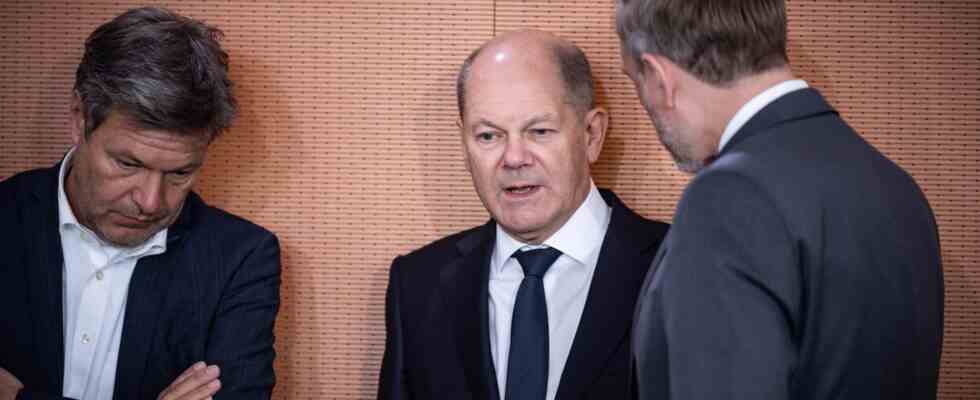Status: 05.03.2023 11:14 a.m
Transport policy, energy policy and budgetary issues: Before today’s closed conference in Meseberg, the traffic light coalition is crunching. Where is the problem?
Relationship status: It’s complicated. This is how the relationship of the traffic light coalition could be described. “The statics of the traffic light fluctuate,” fears political scientist Andrea Römmele from the Hertie School of Governance.
The coalition partners themselves are trying to present a different picture to the public. Deputy government spokesman Wolfgang Büchner said last Friday: “The working atmosphere in this coalition is good, even if you have different positions on certain issues.” The topics that are currently being discussed in the coalition would only be discussed on the fringes of the retreat in Meseberg.
Is it over with the red-green love?
It was clear to political scientist Antonios Souris from the Free University of Berlin from the start that the SPD, FDP and the Greens were not a love affair, but rather a “marriage of convenience”. “In the last year and a half, the coalition partners’ love for each other hasn’t grown any further either. The coalition partners are increasingly realizing that their political positions are sometimes diametrically opposed and, parallel to government responsibility and coalition responsibility, they are also trying to do justice to their respective groups of voters during the war reigns in Europe.” A big task.
After the re-election in Berlin, one can say with certainty: the red-green love is over here. This week, the CDU and SPD announced that they want to hold coalition negotiations. The top candidate of the Greens, Bettina Jarasch, accuses the SPD leadership of having thrown “dirt” around.
Some of the Social Democrats are also disappointed, according to Ülker Radziwill from the Berlin SPD and co-chair of the “Forum Demokratische Linke 21”. Their goal: to pool left-wing forces in the SPD. In Berlin she would have liked the red-green cooperation to last. But: “I keep finding that you are clearly alienated. And this alienation definitely doesn’t make sense.”
A war of roses in Berlin, which also shows how the relationship at the federal level is crumbling. The Green Youth has clear expectations of the SPD at federal level, says spokesman Timon Dzienus: “I think we can come together again if the SPD stops just standing on the sidelines (…), but when the SPD finally gets together again positioned in terms of climate protection, basic child security and the traffic turnaround.”
Evergreen: transport and energy policy
For political scientist Römmele, the most relevant point of contention in the coalition is a fundamental conflict between the FDP and the Greens: “Traffic versus climate – Volker Wissing’s traffic projects must be reconciled with Robert Habeck’s climate requirements.” The FDP is trying to sharpen its profile again. After the poor results of the last state elections, the Liberals would “fear for their existence in parliament” if the downward spiral in the state elections in Bremen, Hesse and Bavaria continued this year.
When profiling, the liberals focus on Germany’s favorite child: the car. The FDP is campaigning at EU level for an exception for so-called e-fuels, while the Green Federal Environment Minister Steffi Lemke supports the planned ban on new cars with combustion engines from 2035. In addition, the FDP would like to expand roads faster with reference to the traffic forecasts, while the Greens are calling for more effort in the transport sector in order to achieve the climate goals.
Conflict between climate protection and freedom
The car as a symbol of a permanent conflict between the coalition partners. Political scientist Souris estimates that this is particularly difficult to solve: “FDP and Greens have opposing political positions that reflect on the principles of the parties. The FDP associates the car with individual freedom, while the Greens see cars as more of an obstacle to the mobility revolution. This actually creates a conflict between climate protection and freedom. That makes compromise solutions between the coalition partners more difficult.”
In addition, the FDP is opposed to Minister of Economics Habeck’s plans for a possible early ban on new oil and gas heating systems. Political observers are curious to see whether Scholz in Meseberg will act as a mediator on these controversial issues in order to keep the coalition together.
The budget debate
Economics Minister Robert Habeck and Finance Minister Christian Lindner also clashed when it came to the 2024 federal budget. The FDP is sticking to the debt brake, while the Greens are apparently concerned that there might not be enough federal funds available for their projects. An example: the dispute over basic child security.
The Federal Minister of Defense would also like more money from the SPD in order to modernize the Bundeswehr. Desires that Lindner has to fight for together with his coalition partners. Budget deliberations begin in mid-March. So there is still a little time to calm things down in the coalition.
“I assume that attempts will be made to resolve ongoing disputes in Meseberg so that the government can present a unified image again,” says political scientist Souris. He is optimistic that the coalition has found pragmatic ways of working together despite the rhetorical disruptions in the past. Even if the relationship status of the coalition is currently “it’s complicated”, a divorce is far from in sight.
More about this in the “Report from Berlin” at 6 p.m. in the first.

